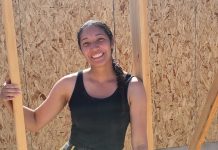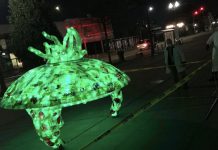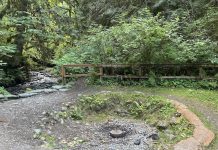The film Promised Land has been out for an entire year, but as word of mouth spreads its popularity continues to grow. Now the documentary, which follows the Duwamish and Chinook tribes as they fight for long-denied treaty rights and explores the way government and society still perceive tribal sovereignty, is coming to Saint Martin’s University. “I’m really glad it’s picking up steam,” says filmmaker Sarah Salcedo. “People are hungry to know whose land they’re on and how they can be good allies in this day and age.”
On Friday, October 6, the film will be shown as the culminating event of the Symposium on Teaching and Learning at Saint Martin’s University’s Worthington Center. The screening is open to the public and a discussion panel with representatives from both tribes as well as the filmmakers will follow.
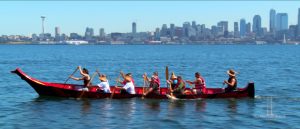
The ongoing battle to restore the Duwamish tribe’s treaty rights began in 1855 when Chief Seattle signed the Treaty of Point Elliott, relinquishing tribal lands to the U.S. government in return for reservations, fishing and hunting rights, and a settlement of $150,000. Those rights never came, and the tribe has been petitioning the government since 1977 for federal recognition. In a similar vein, the Chinook tribe, which played a key role in the Lewis and Clark expedition during the winter of 1805, has been fighting for recognition for 160 years. Salcedo and her husband Vasant produced and directed the film through their company Tall Firs Cinema.
The film is a good fit for the symposium says Irina Gendelman, Associate Professor of Communication Studies at Saint Martin’s and Chair of the Society and Social Justice Committee. “The theme of the symposium is ‘Place, Community, and Experience’ and it’s focused on place-based education,” she says. “We’re focusing on where we live and how that can inform the classroom and make teaching more meaningful. Students become more engaged and excited about learning when they can connect to real life.”
Conversations between the university and the filmmakers began after the theme of place was confirmed for the symposium. “We were brainstorming with folks in the communications department about some sort of documentary that would set the tone for the day,” says John Hopkins, Associate Dean of Students and Director of Service & Diversity Initiatives. “We were thinking about how we could address diversity and equity with the campus community, and then we discovered these filmmakers.”
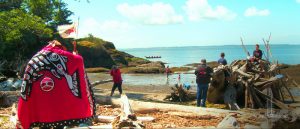
Hopkins hopes the documentary and ensuing discussion will have an impact on Saint Martin’s and beyond. “First, there’s our students,” he says. “It’s really important to think critically about what it means to be in a place, within a greater understanding of place from people who have been here far longer. For the greater community, we need to deepen our awareness of where we live.”
According to Salcedo, the film takes a different approach to covering tribal issues. “Usually documentary films cover the individual tribe but the politics don’t get mentioned,” she says, citing Sandy Osawa’s recent Princess Angeline as an exception. “The larger issue is a broken system that imposes colonial mindsets on sovereign nations. It’s not in the past. It’s still happening.”
The pair are glad to see their film used as an educational tool. “We love the idea,” says Salcedo. “Since we first debuted the movie we’ve been getting emails from teachers saying, ‘When is this going to be available in schools? We need this for our students.’ The response from the educational community has been so exciting. We hope that in the future, there will be more space to shine light on communities that don’t have ways to get their stories told.”
Given the current national conversation about monuments, Gendelman believes the film is coming at exactly the right time. “We don’t have a lot of monuments about native people’s history,” she says. “This is a way to bring that voice to the foreground. Creating a space to view and talk about it is important. It’s a way to provide the full history, not just what’s been reported.”
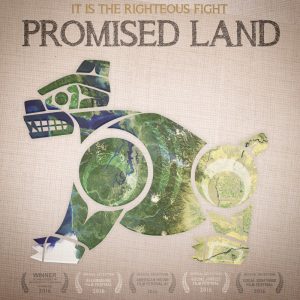
People are hungry for these stories, Salcedo contends, dealing with questions of identity in the face of oppression and the struggle to maintain hope. “This fight is ringing true with a lot of people right now. It’s exciting to see a broad number of people as inspired as we are.”
This is the first such film the Communication Department has featured, but Gendelman hopes it won’t be the last. “We’re very interested in having more film series and bringing in more native filmmakers,” she says. “We’d also like to talk about independent filmmaking, why it’s important and how it connects to higher education.”
For her part, Salcedo hopes viewers leave the screening motivated to act. “It doesn’t have a happy ending,” she warns. “It’s more of a note of somber determination.” But it’s not all somber, says Vasant Salcedo. “We’re constantly hearing how much laughter plays a role in the perseverance of these communities. The amount of hope that they have is really inspiring.”
The public is invited to view “Promised Land” on Friday, October 6 at 6:00 p.m. in Worthington Conference Center at Saint Martin’s University. For those interested in participating the day-long symposium on October 6, “Place, Community, and Experience: Creating Local and Global Connections,” visit Saint Martin’s Symposium on Teaching and Learning website to register.
Find more information, including registration, for the Symposium on Teaching and Learning’s culminating film screening of Promised Land online. To learn more about Saint Martin’s University, visit www.stmartin.edu.

